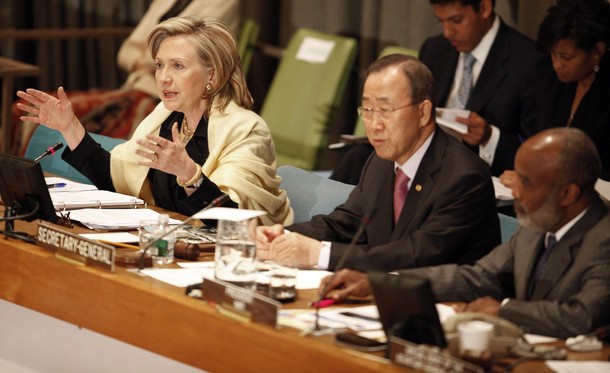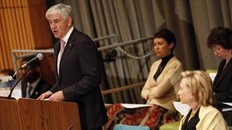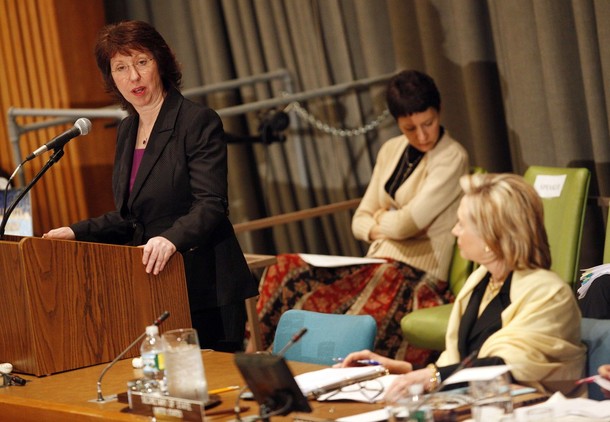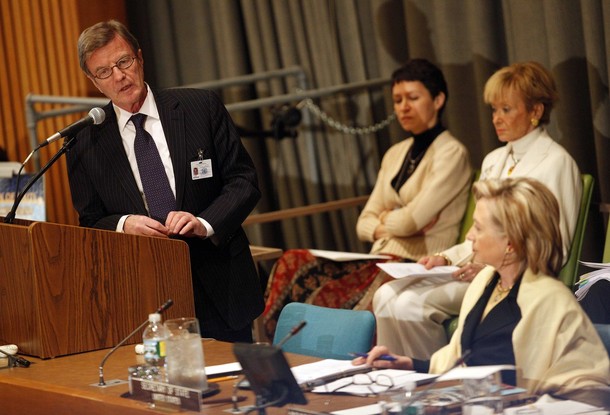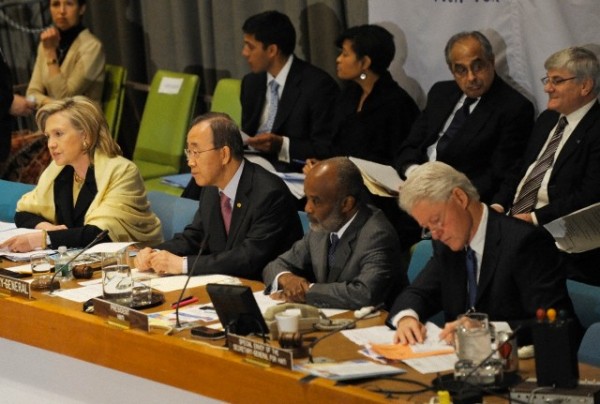“The following is the transcript of Secretary Clinton’s interview for Frontline Haiti, which aired on March 30th on PBS.”
QUESTION: You were about to – you had undertaken a strategy review vis-à-vis Haiti prior to the earthquake, and you were about to release this. How does that change now?
SECRETARY CLINTON: Well, when I became Secretary of State, I spoke with the President about Haiti – and I have a longstanding interest going back many years in Haiti – and I had presented to him the idea that our government would look to see what we could do to try to help Haiti’s development.
So for the year that preceded the earthquake, that’s exactly what we did. I had my chief of staff and counselor, Cheryl Mills, work in a whole-of-government approach and we sent a lot of experts from government agencies here in the U.S. And we worked closely with the Haitian Government. President Preval had his own national development plan and we wanted to support that insofar as we could.
And we were about to roll it out because we wanted to bring that attention to it, and then the earthquake came. So where we are now is to take all the work that we’ve done in the past year to focus U.S. Government efforts in a few specific areas – namely agriculture, health, energy – particularly electricity – and security, governance, rule of law – and to work with other international partners to fill in gaps and to give us the broad buy-in from the international community that is necessary if we’re going to have a long-term commitment to Haiti’s future.
QUESTION: Why is Haiti important?
SECRETARY CLINTON: I think it’s important for several reasons. First, it’s a neighbor. I mean, it’s in our hemisphere. And it’s the poorest country in the hemisphere by quite a measure. It was the first black republic in the world. And the United States has played a role in Haiti’s history, oftentimes not to our credit and to their detriment. When the slaves overthrew their French colonial masters and became an independent country, shortly after our own country became independent, the United States didn’t recognize Haiti for 50 years. Other countries turned their backs on Haiti. We’ve had a long and troubled history with Haiti, and Haiti’s had its own troubles of its own making.
So I think that when you look at its strategic location, the fact that there’s a very large Haitian American diaspora community in our country, it really was both a challenge and a rebuke to us. And I thought it would be worth trying to see, with a government that has the right instincts and a president who is committed to a better future, as President Preval is, to see if we couldn’t be a better partner.
QUESTION: You said that in the past, development has basically been parachuted in and hasn’t necessarily been sustainable. You talk about being a partner, not a patron.
SECRETARY CLINTON: Right.
QUESTION: What do you mean?
SECRETARY CLINTON: Well, Martin, part of it is that we have a long history of involvement with Haiti, and most of it, going back many decades, has been through nongovernmental organizations, charities, church groups, all kinds of American involvement. And we’ve had this sporadic American Government attention and then withdrawn.
QUESTION: Embargos and invasions.
SECRETARY CLINTON: Yeah, embargos, invasions in the 1920s and then restoring a democratically elected president to office in the 1990s and then a reaction in our own government against further involvement. I mean, we’ve had a very checkered involvement. And I think it’s important to build the capacity of the Haitian Government to recognize the resilience and the capacity of the Haitian people.
And to do that, you can’t be a patron in the sense of “We’re here to help you.” But it is more along the lines of “Okay, let’s work together. What do you need? Here’s what we can offer. Here are the conditions and the accountability that we would seek and here are other partners,” both of other governments and nongovernmental organizations.
QUESTION: I think a lot of people would look at Preval and ask this question as to whether or not he’s a reliable partner. He’s been through three prime ministers in the last 2 years. He was largely absent after the quake. He failed to address his people, came in for a lot of criticism. And on the streets, he is very unpopular at this point. Is he a reliable partner?
SECRETARY CLINTON: He is a reliable partner, but he is a partner who has very serious challenges when it comes to capacity. He had them before the earthquake. He has them even more so now. But one of the ironies that --
QUESTION: Can I interrupt?
SECRETARY CLINTON: Yeah. Sure.
QUESTION: What do you mean by capacity?
SECRETARY CLINTON: Well, that he has a government and a political system and a social structure which is very entrenched in the way it has always done business. And he has worked hard to overcome that. And I just wanted to mention that literally, the night before the earthquake on PBS – I think it was the Jim Lehrer show or whatever it’s called now, I don’t know, the --
QUESTION: Yeah, it is the PBS NewsHour.
SECRETARY CLINTON: PBS NewsHour.
QUESTION: Right.
SECRETARY CLINTON: In the hour, there was about a 15-20 minute segment on Haiti. It was so hopeful. It talked about all the changes, how this was Haitian-driven development that the United States and others were helping at the U.N., having asked my husband to be the private sector representative, was really digging in and talked about a big investment conference that had been held and how international businessmen from around the world were signing up to build factories, to pursue tourism possibilities. Less than 24 hours, the earthquake comes.
So I want to put it in a broader context that President Preval was making some very important commitments to change and seeking actively to have the support of others in the hemisphere and beyond. And yet, he was the first to say, look, we have a lot of challenges here. We have an enormous number of very poor people. We have a development strategy that was just basically growing up by inadvertence so that people were leaving the countryside, coming into the large metropolitan area of Port-au-Prince. I mean so many things that he had recognized and highlighted as in need of change.
Well, the earthquake happens and, I have to say, his response was very human. I mean, this was an overwhelming disaster. And I met with him within days of the earthquake hitting. He was very engaged about what needed to be done, but he was also very cautious. He didn’t want to over-promise. He didn’t want to get out and talk about what was going to happen until he had a better idea of who was alive, what was left of a government that was devastated with the buildings destroyed and records destroyed, the prison destroyed and prisoners out on the street. I mean, he was trying to be very responsible.
And yes, I know that there was criticism that he didn’t do enough in the public. He’s trying to, I think, make up for that, but the fact is that he has been very focused and struggling against difficult political odds. Because remember there was supposed to be a parliamentary election in February. So his parliament is basically living on borrowed time. There was supposed to be a presidential election later this year. He’s very acutely aware of the need for political stability and political legitimacy. So we’re working very hard with him and hoping to provide him the support he needs for this last year of his term.
QUESTION: Did you say anything to him on that Sunday about his failure to stand on the rubble?
SECRETARY CLINTON: Well, it was Saturday that I was there.
QUESTION: I’m sorry. On that Saturday, did you say anything to him?
SECRETARY CLINTON: We did. Because he and I did a press conference together and that was the first time that he had gone into public.
QUESTION: First time I saw him.
SECRETARY CLINTON: That’s right. And I told him it was very important that he do that with me and he was absolutely in agreement.
QUESTION: It looked like you kind of talked him out into the cameras.
SECRETARY CLINTON: Well, I hadn’t been traumatized by the earthquake. I hadn’t seen the destruction and damage of my country. I mean I remember how I felt after 9/11 and how difficult it was and just trying to begin to catalogue what we were going to need to do as a senator from New York. And here he is, the president of a country that has been just devastated. So I had some understanding of what he must be going through.
QUESTION: The U.N. was also on its back.
SECRETARY CLINTON: Right.
QUESTION: They had lost a lot of people, and their ability to respond to the quake was severely limited. So for those first few days, stuff was piling up at the airport and nobody was moving it into the city or very few people, not enough trucks. Did you talk about airdrops doing anything that could have gotten that aid into communities faster than we did?
SECRETARY CLINTON: Well, I think we moved as fast as the logistics permitted. The airport had been damaged. The air control tower had been damaged. The one inadequate runway had been damaged. And I worked out with our ambassador, who has done a superb job on the ground, Ken Merten, an agreement that President Preval signed that Saturday to provide greater leeway for America to operate.
Two days before, Ambassador Merten had worked out the agreement on the airport being opened up and U.S. military personnel took over the airport. There was a lot of concern about airdrops. And because, in talking to the experts who do this in our military, they said, “First of all, we are still rescuing people. The last thing we need is to be dropping aid in areas where people might still be alive and having all kinds of commotion occur and maybe even people disrupting the rescue mission.” So it was very complicated.
But we got the airport up and going and we began to deliver the assistance and I personally followed this very closely, and I think that the devastating blow the U.N., losing their leadership, more than 300 associated personnel losing their lives – MINUSTAH, which is the U.N. peacekeeping mission under the command of a Brazilian general being also devastated, and the general wasn’t even in Port-au-Prince at the time. We had to help bring him back, so that we began to put together what were the building blocks of a safe relief operation.
And that is something I really want to emphasize. As bad as the terrible devastation was, we didn’t want military assets, ours and others coming in and making it worse. So we proceeded in a careful way. But within days, we had troops on the ground, we had vehicles delivering assistance, we worked to support the delivery of aid from other countries. So within days, we were managing the most far-ranging search-and-rescue mission in world history, as far as we know.
QUESTION: You talk about jobs and the necessity of acting as partners, not patrons --
SECRETARY CLINTON: Right.
QUESTION: -- building a sustainable Haiti with its own economy, the apparel factories that are being talked about in this light, pay about three to four dollars a day. Can you build an economy on that?
SECRETARY CLINTON: Well, actually, there’s been an increase in their minimum wage, but yes, you can. And you can build an economy if it is embedded in a political system that can be functioning to make sure that resources are more equitably shared, a reconstruction program that focuses not just on Port-au-Prince but on the whole country and particularly the agriculture sectors, which is what’s – provides the support for 60 percent of the people to start with, and with the duty-free importing from Haiti, which the United States --
QUESTION: The HOPE Act.
SECRETARY CLINTON: -- the HOPE Act had offered. We’re going to try to extend that to other countries like Brazil and others within our hemisphere and beyond. It is a way to build a foundation and then to move on from there. I know people say, well, three to four dollars – I think it’s more than that, but --
QUESTION: It’s a little more than that perhaps --
SECRETARY CLINTON: Yeah, it is, but --
QUESTION: -- but the people that I talked to actually said they were getting four or five dollars a day.
SECRETARY CLINTON: Yeah. It is clearly not sufficient by our standards, and it will not be sufficient by Haitian standards, but the idea of creating enough jobs, trying to get back to where we were in the garment industry in Haiti before the embargo imposed by the United States in the – I don’t know what we call it, but the first 10 years of this new century. The population of the garment factories was decimated. And we, before the earthquake, had about 28,000 people working. We want to reengage with that, get more people back into those factories. But we also want to broaden the base of the economy. And when the assessment of needs was done very quickly, shortly after the earthquake, we realized that the port was damaged and nobody would be able to fix it except for the United States military, we made it very clear we want to move more cargo through that port than was coming in before. And we are now moving more containers than were moved before the earthquake.
So these are all signs that we’re getting back to economic life. The American aid programs are employing thousands of people to move rubble, for example. But it is a – it’s a very low base. And hopefully over the next year, as we try to build a more sustainable economy for Haitians themselves, we’ll see increases in things like wages and education and health care and other indices of progress.
QUESTION: You talk about “as we go forward and build a better Haitian economy,” can we really be expected to build a better Haitian economy or is this something only the Haitians can do?
SECRETARY CLINTON: Well, the “we” covers everyone from the Haitians through the U.S. to the international community. But I’ve been very heartened by the response of the international community. The needs assessment that the World Bank is currently undertaking, which we will have in preparation for the international donors conference on March 31st, shows --
QUESTION: Tomorrow night.
SECRETARY CLINTON: (Laughter) – shows a commitment to Haiti that has been lacking up until now. We can’t guarantee results but we can guaranteed that we’ll be smart about how we engage with the international community and with Haitians themselves, and that we will try to have an economic plan, a reconstruction plan that makes sense, that is in keeping with the Haitian culture.
I’ll give you an example. I mean, when we met with the UN people on my visit the Saturday after the earthquake, a lot of them had had experience in other disasters, and the immediate response was, “Well, we need to create very large camps.” I mean, one of the UN experts said 100,000. I mean, he said, “No way. We’re not going into camps like that. We’re going to stay as close as we can stay to our little piece of property here. It may be damaged but it’s all we’ve got.” So you’ve got to be sensitive to the Haitian experience and the Haitian ideas about what they’re going to want. And as we put together all of these plans, the Haitians have to be in the lead, and the international community has to be supportive.
QUESTION: Why haven’t we gotten it right in Haiti before? I mean, we’ve had – it’s right on our doorstep --
SECRETARY CLINTON: Mm-hmm.
QUESTION: It’s a small country. We take on nation-building projects in bigger places with sectarian divisions. This is a rather simple exercise compared to Afghanistan or Iraq. Its nine million people on the doorstep of one of the greatest, biggest, most powerful markets in the world. Why have we not gotten a better relationship with Haiti and gotten off the starting line before?
SECRETARY CLINTON: I think the simple answer is neither their politics nor ours has ever permitted it. Their politics has been rocky, to say the least, since the very beginning of their country. They haven’t always had the very best leadership. And they’ve had a very unequal society, where those on the top were, frankly, not interested in investing on those on the bottom. And we see that all over the world. And then Haiti often became a political football in American politics. And there are many reasons historians can point to as to why the mix just never was right.
But that’s one of the reasons why I went to President Obama when I became Secretary of State and I said, “Look, we just – this is intolerable. We cannot in our hemisphere in good faith have a country as poor as Haiti, as unequal as Haiti, when we see the results of educated and very resourceful Haitians coming to our country and being so successful.” I mean, I represented a large Haitian American community in New York City and in Rockland County, across from Westchester County, as you know, where you had doctors and lawyers and business leaders and teachers. So why can’t that be translated back in Haiti? Why do people have to leave Haiti unless they’re part of a very small elite? Why do they have to leave to realize their dreams? That shouldn’t be, in the 21st century. The President totally agreed with me, and so we were engaged before the earthquake and we’re going to try to be a better partner this time around.
QUESTION: Former Prime Minister Pierre Louis – Michele Pierre-Louis, who you know --
SECRETARY CLINTON: Mm-hmm.
QUESTION: She said the problem in Haiti – what worries her is the lack of transcendence – that people don’t think beyond their own self-interest.
SECRETARY CLINTON: Mm-hmm. We see that all over the world. It is not, by any means, unique to Haiti. I have seen it in every setting and on every continent that I have visited. It is a real problem in the development challenge that we are looking at. How do you get, particularly the economic and political elite, to feel invested in the development of those with whom they are not related, who they view as less educated, who they think of as somehow subservient in cultures from Haiti to Pakistan. I mean, it’s a common problem. And that’s why I am supportive of President Preval because he was very clear that he wanted to break that mindset and end that cycle. He wanted to really look at what hadn’t worked in Haiti in the past and try to come up with better answers. And we want to keep supporting him during this last year in office and the wake of this terrible earthquake.
There are no guarantees, but I think we have a better shot today, in part because this earthquake has shaken, literally, everyone. It was not a respecter of educational or economic status. It devastated the Port-au-Prince larger metropolitan area. So this is an opportunity for us to be able to say, okay, let’s really think about what kind of future you want for all of Haiti. And that’s what we’re trying to pose as the context for this.
STAFF: Last question, Mike.
QUESTION: Okay. Some Americans take a look at this and say, look, we’ve got our own problems. We have not fixed – we’ve not rebuilt New Orleans.
SECRETARY CLINTON: And shame on us.
QUESTION: And now we’re going to take on Port-au-Prince.
SECRETARY CLINTON: Right. To that I’d say, because I’ve had this conversation with many people, is number one, Haiti has been in the past a security and immigration challenge to us. We have people who risk everything to get on creaky little boats to try to make it to our shores. So it’s not a problem that is way over there – hundreds of miles off our coast. It is often a problem that we live with right here at home.
But secondly, we now have a broad base of international support. This is not the United States coming in and saying, “Oh, let us fix it.” This is the United States, along with international organizations and countries from France to Canada to Brazil to Japan, saying we all will play a role.
Half of – nearly half of all American households have contributed to Haiti relief.
QUESTION: I know. I hear that stat and I can’t believe it.
SECRETARY CLINTON: Isn’t that stunning?
QUESTION: Well, I don’t know. Is it true?
SECRETARY CLINTON: It is true. It is true. Because if you take what we started at the State Department, which was the SMS texting message for $10 cell phone contributions, first to the Red Cross and then to the Clinton Bush Fund, $32 million to Red Cross, $31 million just through that one means of contributing, over $700 million contributed from Americans to their churches or to other organizations that they had confidence in, plus the United States has spent many hundreds of millions dollars in deploying USAID and deploying the military and so much else. So we are already invested, and we don’t want that investment to go to waste. We want that investment to realize a positive outcome.
QUESTION: No shortage of good intentions.
SECRETARY CLINTON: But this time good plans, too. I mean, I might not be as confident sitting here if we hadn’t been working for a year, if we hadn’t made that decision back in January, and if I hadn’t seen the outpouring from around our hemisphere. Every country, even the poorest – little Honduras, little Guatemala – they’ve all contributed something to Haiti. The Dominican Republic, which shares the island with Haiti – and there’s always been a contentious political relationship – has gone above and beyond the call to assist Haiti, so everybody’s invested in this.
And the United States leadership under the Obama Administration has put to rest a lot of old myths. Initially, there was some concern and some of the old ideas being pulled out about imperialism and Yankees; all of that is gone. I mean, I just came back from as trip to Latin America – a lot of positive reinforcement for the way we’ve handled it, for the fact that, yes, we took the lead – only we could have opened the airport, only we could have fixed the port. But we have been sharing – we helped transport medical supplies for Cuban doctors. We are working with Venezuela on this common project. So it’s near us, we have a lot of Haitian Americans, we have a security and immigration challenge, we have a tangled history. We had a plan that we’ve worked on for more than a year, and we have an opportunity to show leadership in our hemisphere in a way that we cannot downplay in terms of its importance going forward.
QUESTION: But the moral obligation and practical reasons to help --
SECRETARY CLINTON: It’s both the right thing to do and the smart thing to do.
QUESTION: Secretary, thank you very much.
SECRETARY CLINTON: Thank you very much. Nice to see you.
# # #



